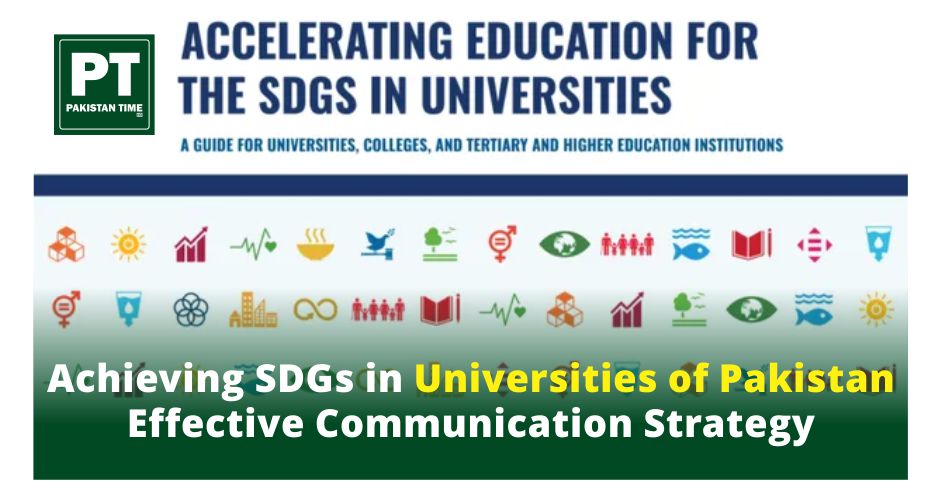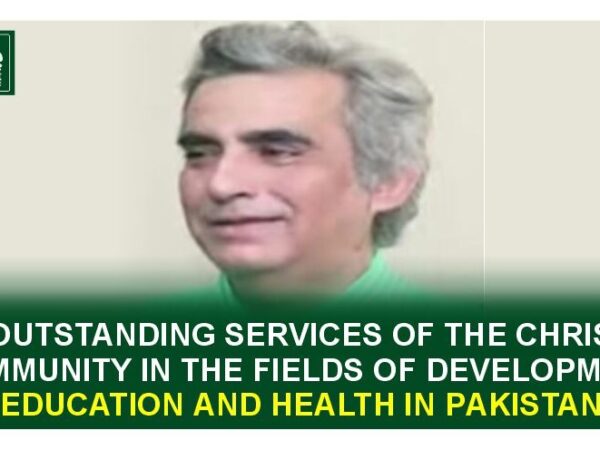Achieving SDGs in Universities of Pakistan Through Effective Communication Strategy
The prioritization of Sustainable Development Goals in the contemporary world is important for the continued existence of humanity. Pakistan is among the list of countries that are a top priority for sustainable development goals. Under the prevailing circumstances, the effective realization of SDGs is paramount. To ensure the success of any concept, prioritizing the mobilization and awareness of the appropriate audience is crucial. Being a media management professional, I must say the key to success is effective communication. Half of the world’s population is young people and they are the most action-oriented audience as well. The youth possess considerable energy that, when directed appropriately, can expedite a solution-oriented approach. For this reason, the United Nations has a special focus on involving the youth of countries and mobilizing them toward achieving SDGs. In 2018, the Government of Pakistan and the UN in Pakistan signed the UN Sustainable Development Framework (UNSDF), also known as the Pakistan One United Nations Program III (OP III) 2018-2022. Under this agreement, the UN is working in close cooperation with the Government of Pakistan to ensure the attainment of SDGs for a better future. A key element in the implementation of the SDGs program by the UN in Pakistan is the localization of SDG goals. These 17 goals of SDGs include No poverty, zero hunger, good health and well-being, quality education, gender equality, clean water and sanitation, affordable and clean energy, decent work and economic growth, industry, innovation and infrastructure, reduced inequalities, sustainable cities and communities, responsible consumption and production, climate action, life below water, life on land, peace, justice and strong institutions, and partnerships for the goals.
With the well-defined and targeted nature of SDGs for developing countries to confront future challenges, a significant question arises: To what extent have we succeeded in achieving these goals? How effectively has the youth been mobilized toward solution-oriented approaches? Are we employing the correct communication strategy with the youth regarding SDGs? There have been many seminars and conferences relevant to SDGs in the universities of Pakistan, but do they suffice the purpose? And how the change, if any, can be measured? The objectives of any campaign are systematically prioritized for evaluation after a specific period. I do understand the intricacies of communication required to bring behavioral change in the youth regarding SDGs. While the task is undeniably challenging, it is not impossible. In my perspective, I would initiate by proposing recommendations for the execution of a strategic communication plan tailored for the youth enrolled in Pakistani universities. This plan aims to foster a transformative shift in their approach and behavior concerning the understanding of SDGs. While seminars and conferences play a role, their impact is limited. The substantial gap can only be bridged by formulating an effective communication strategy after consultations with donor agencies and educational institutions through an effective communication management plan from the grassroots level, a dimension conspicuously absent in the current implementation strategy of SDGs in universities across Pakistan. I propose offering guidelines as a foundation for an effective communication strategy aimed at motivating students to engage in the SDGs. This approach will assist them in acquiring a deeper comprehension of this field.
- The first step is empowering students, and this can be achieved by giving them the confidence to progress in their learning, post-project or campaign, and by encouraging them to share their work with industries and broader student communities. This can be achieved through the creation of their own media content or direct interactions with the target audience.
- Student societies have the potential to achieve remarkable outcomes. Establishing a central SDG society can serve as the umbrella organization, under which various societies aligned with each specific SDG goal can be formed. It is recommended that these student societies become compulsory in all public and private sector universities, enabling them to submit reports to the relevant authorities.
- Aligning specific SDGs with various university programs and courses can enhance implementation and foster a deeper understanding among students.
- Powerful incentives are always encouraged for students to motivate them to exert greater effort and maintain focus on SDGs; therefore, it is essential to make the recognition of outstanding projects, plans, or campaigns of students. The incentives can be in the form of training courses, workshops, and exchange programs to advanced countries that cater only to the students.
- An effective strategy for advancing Sustainable Development Goals (SDGs) involves adopting a localized approach. For instance, universities in Lahore may prioritize ‘Climate Action’ as a key focus area, considering the concerning air quality index in the city. They can then design and implement targeted activities to improve the local air quality index in their vicinity.
- Promoting healthy competition among universities to gauge the success of SDG implementation is crucial. This encourages benchmarking and inspires the design of tailored activities to enhance progress in achieving sustainable development goals.
- Media should be an integral part of the implementation strategy of SDGs as it is necessary to highlight all the activities relevant to SDGs on media platforms.
- Greater emphasis should be given to practical outcomes and rigorous measurement of the impact ratio following awareness events related to SDGs. Rather than relying on one-way communication for content delivery without assessing its impact, strategic communication planning should be implemented at both ends of the spectrum.
Under current circumstances where Pakistan is facing severe problems relevant to SDGs, it is imperative to understand the importance of making proactive decisions toward a solution-oriented approach. There are cases globally where SDGs have been addressed and the success ratio has been measured. We need to communicate the successful case studies from our neighboring countries which rank better in SDGs in the overall performance of all 193 UN Member States to all stakeholders in Pakistan. For example, Sri Lanka at 83, Bangladesh at 101, and India at 112 whereas Pakistan ranks lowest among all at 128. I would like to express my appreciation for the commendable efforts undertaken by various governing bodies, such as HEC, PHEC, and HED, in organizing numerous conferences and workshops to disseminate awareness about Sustainable Development Goals (SDGs). While these initiatives mark significant progress, there is a need for enhanced attention to implementing these strategies at the university level. Emphasizing all research projects aligned with SDGs on prominent platforms should be a priority, as this would effectively raise awareness within the academic community about the vital significance of this integral subject. When establishing goals and targets related to SDGs, it is essential to set them realistically, considering the available resources within the community. Realistic goal setting is pivotal for achieving measurable outcomes that are appropriate and attainable. As a Public Relations professional working at Lahore College for Women University, I would also like to highlight the significant contributions of LCWU toward attaining SDGs under the leadership of Vice Chancellor Professor Dr. Shagufta Naz, such as providing university transport and discouraging the use of personal vehicles by students, empowering visually impaired students in various programs of university on a priority basis, fostering entrepreneurship through the Khadija tul Kubra Business Incubation Center, establishing a mental health assessment center for faculty and students, achieving high education rankings at global and national level, and excelling in Gender Equality (SDG 5) among all universities of Pakistan. Despite commendable progress, the article suggests the need for more proactive measures and youth engagement to strengthen the implementation of SDGs in public sector universities through the adoption of an effective communication strategy. The proposed practical guidelines aim to assist policymakers and stakeholders in achieving measurable outcomes and advancing the implementation strategy for future.
Author Details

Media Management & Public Relations Specialist.
(Dr. Barira Bakhtawar holds a PhD in Mass Communication specialising in Media Management and Economics and is a Public Relations and Communications expert. She contributes as a faculty member to various public and private sector universities in Pakistan. She addresses social and educational issues through her writings on various platforms. You can reach the author at barira.bakhtawar@lcwu.edu.pk.)








